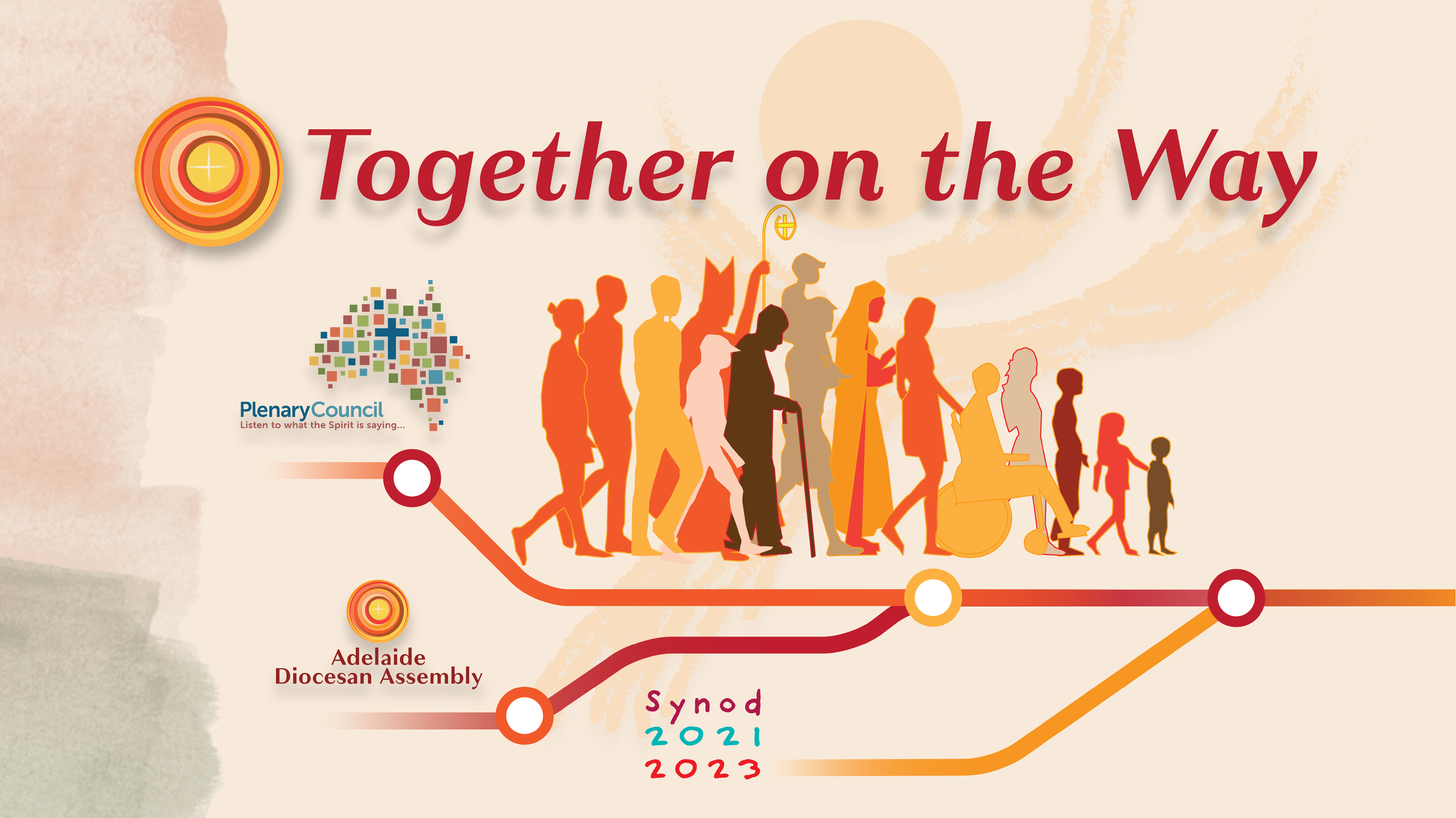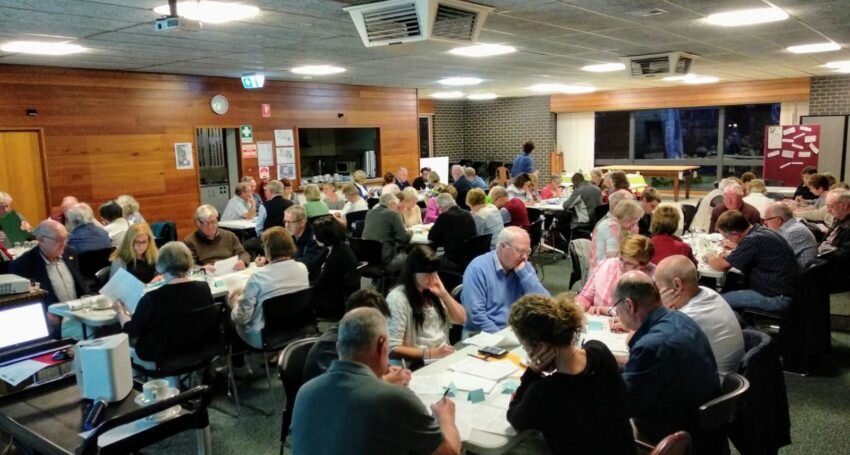Latest News
Preparing the way for Diocesan Assembly
In a letter to the faithful, Archbishop O’Regan said the 2022 Assembly on October 21 and 22 would be informed by the recommendations and subsequent feedback from the 2021 gathering, as well as the discernment of the Diocesan Pastoral Council and the Plenary Council outcomes.
“The 2022 Diocesan Assembly will build on the 2021 recommendations and provide opportunities for formation, skill-building and strategic planning,” he wrote. “It will also be an opportunity to look at the results of the Plenary Council and how they will be incorporated into local and Diocesan life.”
Archbishop O’Regan said assemblies would become a “regular fixture of Diocesan life” with at least one more planned for 2023. “After that, assemblies may occur every other year with parish or deanery assemblies encouraged on the alternate years,” he said.
Peter Gates, deputy national director of Catholic Mission, the official international mission aid agency of the Catholic Church, will be the keynote speaker at the 2022 Assembly.
A member of the facilitation team for the Fifth Plenary Council for the Catholic Church in Australia, Mr Gates has worked in leadership and management positions across a broad section of key organisational responsibilities and departmental roles. He also has served as board member for a number of not-for-profit organisations.
Diocesan Assembly steps up a gear
Last month the Archdiocese distributed a ‘toolkit’ of resources including a workbook for communities to use as they discern the 255 recommendations arising from the 2021 Diocesan Assembly.
Over coming months, parishes, communities and schools will choose their top three recommendations for what the Archdiocese needs to focus on, as well as the top three recommendations for their own local context.
Following that, communities will work to develop key strategic actions and goals to achieve the recommendations.
Playing the timely tune, singing the timely song
The Plenary Council, the most significant event in the life of the Catholic Church in Australia for 80 years, comes to its conclusion in early July in Sydney, with the second session.
For most people who have been on the journey of these past six years it has been a fruitful time. My own experience is that while the process was unfamiliar to me, it is not an unfamiliar pathway of the Church over 2000 years. I have found that one can only understand what synodality is all about when you are part of it. Just because it is unfamiliar; just because it has called us to learn new, or forgotten skills such as listening, collaboration and discernment; just because it is not perfect, does not mean that the process is wrong or that we should as those signs on the highway say ‘Go back wrong way’. It is a legitimate pathway forward.
The Adventure of Journeying Together
Family road trips tend to be the stuff of lore. Growing up in the American Midwest, my family of six regularly piled into our Ford Econoline conversion van to drive several hours across state lines to visit grandparents and cousins. Even the short trips required planning, packing and multiple references to the road atlas. As soon as we climbed into the van, dad would lead us in a prayer for a safe journey and off we went. Stops were frequent – petrol top-offs, toilet breaks, roadside cafes, or the need to blow off some steam after an argument. There were the occasional flat tyres or some other mechanical failure that would force us to delay our trip. Sometimes weather events like a blizzard or tornado would force us to turn around and go back home or spend the night in a roadside motel.
See, Judge and Act in today’s world
There are tensions in our Church life today in Australia. The processes of consultation, listening, dialogue and discerning in preparation for the Plenary Council, our own Diocesan Assembly and now for the worldwide Synod in 2023 have highlighted differences amongst us in responses to the challenges facing the Church. How can we be united in facing these challenges? Use the See, Judge and Act process.
We need to begin with the real situations of people’s lives today. We need to listen, dialogue and grow in understanding of others. We accept and value human experience. We don’t start from what people should be doing or how they should be living. We can’t start from the way things were in the past and just turn the clock backwards. We value and accept the ‘see’ and ‘the truth of experience’.
What’s in it for us?
We drown in information today. What was so brilliant about the consultation and discernment phases of the Plenary Council and our own Diocesan Assembly was the role of discernment and asking that vital question, ‘What do you think God is asking of Australia at this time?’.
If we are not still asking that question then we might be a little bit stuck on that previous question, ‘What’s in it for me?’. While not a bad question, it is inadequate. We need the ‘What’s in it for us?’ so continuing to ask ‘What do you think God is asking of Australia at this time?’ is vital.
Together on the Way
How do the Diocesan Assembly, Plenary Council and 2023 Synod of Bishops tie together?
Young Share Vibrant Faith
More than 100 young people shared their experiences of faith and hopes for the local Church at the Diocesan Youth Assembly held at Nazareth College, Findon Campus, last month. The day included a panel discussion with young participants in the recent Plenary Council of Australia and Diocesan Assembly, group conversations, prayer and music.
Catholic Office for Youth and Young Adults coordinator Peter Bierer said what made the day so special was the “respect and acknowledgment of the diversity of experiences of the participants”.
Communal discernment a way forward
The first general assembly of the Plenary Council, meeting October 3-10, was an extraordinary experience. About 300 members of the Catholic community in Australia engaged in a process of communal discernment involving people from almost every sphere of Church life including laity, deacons, bishops and priests.
‘If you knew the gift of God’
Within the space of a month, three significant events have happened within our church: our local Diocesan Assembly, the first session of the Fifth Plenary Council of the Catholic Church in Australia and the beginning phase of the next Synod of Bishops to be held in 2023 on synodality.
Sharing the Faith
A recurring theme in the discussions taking place during the Diocesan Assembly this month was the absence of young people and families in our parishes. As one parish priest bluntly put it: ‘I am burying an awful lot of my parishioners and I don’t know how I am going to replace them’.
Not that this is anything new – we have been talking about the need to get young people into the pews for decades now. It’s just that as every day passes, the problem becomes more urgent.
We can be tempted to look at ways to make parish life and liturgy more ‘fun’ and appealing to young people, but that’s not necessarily the answer according to Charlie, a 20-year-old pastoral coordinator with one of our parishes and a participant at the assembly.
Moment of Grace
I write these few words just after the first night and day sessions of our recent Diocesan Assembly and before our concluding session a few days later. My deep thanks to our organising team for providing such a powerful experience.
My experience, so far, is that it is a moment of grace for us. Every person I met had been touched by this grace. Each had allowed the grace of their baptism to be renewed. Each was more in touch with the call of God, and the call to service and of fostering this communion.
Grateful to Gather as Pilgrims
The program on Saturday included morning prayer and a panel discussion before participants broke into 36 groups to discuss a number of key themes arising from the consultation process for the Diocesan Assembly.
Issues included outreach and accompaniment of young people and families, inclusion and healing, parish life and liturgy, responding to the cry of the earth and the cry of the poor, and leadership and formation.
Each group discussed two themes and through a listening, dialogue and discernment process came up with 144 recommendations.
Consultation prompts diverse responses
More than 600 responses have been provided as part of the consultation phase of the Diocesan Assembly since a video message was shown at every parish and community in late June. Diocesan Assembly coordinator Peter Bierer said while the number of responses received via the website and postage-paid postcards was “not insignificant” he was still hoping for more people to share their “thoughts, ideas, feelings and hopes”.
“The responses from this consultation phase, along with the local responses from the Plenary Council listening and dialogue process from a few years ago, will guide the development of the agenda for the Diocesan Assembly,” he said.
“So the more responses we receive from a wider diversity of people, the better the discussions will be at the Assembly.”
Being open to other people’s perspectives
There’ll be lots of talking at the upcoming Diocesan Assembly – of course! It’d be a dull event without conversation.But according to Pope Francis, the quality of our gathering will be determined by our capacity to listen to one another. In a major speech from 2015 he urged the world’s bishops to foster a listening church: “It’s a mutual listening in which everyone has something to learn…we are one in listening to others; and all are listening to the Holy Spirit.”
So, what should we listen for? And what will we learn?
Assembly Consultation Begins
Parishes and communities will soon receive a video for screening at weekend Masses and postcards for written feedback as part of the consultation process for the forthcoming Diocesan Assembly.
Assembly crucial in shaping future of local Church
A Diocesan Assembly planned for September, together with the ongoing Plenary Council, will play a “crucial” part in shaping the future of the Catholic Church in Australia, according to respected local theologian Fr James McEvoy.
Assembly with a Difference
On September 17 and 18 this year, delegates nominated from each region of the Archdiocese will gather with Archbishop O’Regan at Cabra College, Cumberland Park, to reflect on the life of our community, and to discern how we can more fully embrace our calling to be the People of God in this place. The event is being organised by a small committee led by Sarah Moffatt from the Archbishop’s office.
Diocesan Planning Underway
About 400 people are expected to attend a Diocesan Assembly in September to reflect on the life of the local Church community, in conjunction with ongoing discernment for the Plenary Council taking place at a national level in October.

















